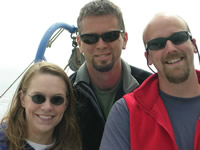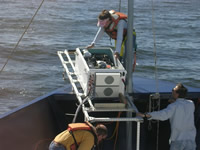


|
The Project
|
September 3, 2005
The daily work of research on the New Horizon has parallels to the work we each do every day. Making observations, asking questions, problem solving, and working well with others are skills used in science that are needed in nearly all jobs. People working in the medical field (doctors, nurses, and pharmacists), people working in construction (builders, painters, and plumbers), people working in municipal water facilities, and many others, often find themselves facing new situations, asking questions, and experimenting with possible answers. New problems (observations) in our daily work often raise questions about the tools or the methods we use. We might ask if the technology being used is correct for the job. Just as in science, it is necessary to solve the problem using observations and testing of ideas to find the best solution. Since some ideas for solving a problem may not work, it is important to accept mistakes and try again. The oceanographers on the New Horizon have solved several problems during this cruise, but not all the problems were solved on the first try! The scientists working in the LOCO project tell me that advances in technology and instruments have made their experiment possible. The science tools available just ten years ago would not be good enough for this experiment. Advancements in technology help people in many situations. Sometimes new technology and advancements in medical equipment permit doctors to be better equipped to evaluate medical situations. Plumbers and general contractors now work with new materials such as flexible plumbers pipe, glues and paints that are made with advanced technology. These advances may make many jobs easier, more time efficient and less costly. Young students that have the opportunity to work with others on projects can gain skills in the scientific method by asking questions, learning to communicate, attempting solutions to problems, and accepting the mistakes. Tim, the chief scientist on this expedition, teaches his students to keep an open mind when working on a project. He encourages them to question all that they read, and to pay attention to observations that don’t fit with what’s already known. The students may then find ways to make new observations that show something new about how nature works. Math: In this math problem you need to make several calculations before you can solve the problem. You may have to work with others to gain the knowledge necessary to solve this problem. You may have to think beyond what’s given to you in the problem. Think of it as a challenge until you find the answer. The parents of twins, Susie and Jim, have offered their children a weeklong vacation tour of the west coast that will include exploring in tide pools, a visit to the aquarium and the science center in Newport, Oregon. Their parents challenge them to get a combined average a 92 % on six of their last exams at school. By achieving this goal they will be rewarded with spending money for the trip. Susie knows that she has four more exams before the end of the year. Jim has three more exams before summer vacation. They both take their history exam on Monday. Susie gets 13 out of 15 correct and Jim gets all of the questions right. On Tuesday they take their writing exam, Susie gets 18 correct and Jim gets 17 correct on a 20-point test. On Wednesday, Susie takes her algebra test and scores an eighty-nine percent. Jim gets an 82 % on his math exam. Have they met their goal? Susie has one more test on Friday. It is her best subject, science, but she knows that the exam covers everything from that year. She calculates what she needs to score on the 100-question test in order to meet their goal of getting an average of 92% on six of their last tests. What score does Susie need to meet her goal?
|


